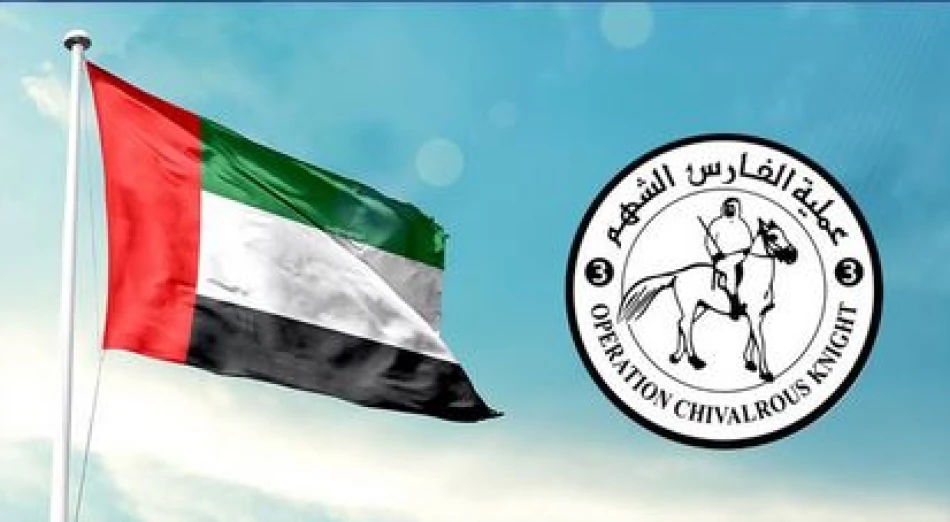
UAE Strengthens Healthcare Lifeline in Gaza: Boosting Medical Infrastructure and Access
UAE's Medical Intervention in Gaza: A Strategic Blueprint for Crisis Healthcare Diplomacy
The United Arab Emirates has emerged as a leading example of how nations can deploy comprehensive medical diplomacy during humanitarian crises, establishing what may become the gold standard for healthcare intervention in conflict zones. Through "Operation Chivalrous Knight 3," the UAE has not only prevented Gaza's healthcare system from complete collapse but has also demonstrated how strategic medical aid can serve broader diplomatic and humanitarian objectives while addressing immediate life-or-death needs.
Comprehensive Medical Infrastructure Deployment
Since December 2023, the UAE has operated a fully integrated field hospital within Gaza, treating over 51,000 cases through April 2024. The 200-bed facility represents more than emergency care—it showcases advanced surgical capabilities, including complex procedures such as the removal of a 5-kilogram tumor that had caused years of severe complications for one patient.
The hospital's specialized prosthetics program addresses one of the conflict's most devastating long-term consequences: limb amputations. This initiative goes beyond immediate medical care to focus on rehabilitation and restoration of normal life—a approach that distinguishes the UAE's intervention from typical emergency medical responses.
Floating Hospital Innovation
The UAE's deployment of a floating hospital off Egypt's Al-Arish coast in February 2024 represents an innovative solution to access challenges in conflict zones. This 100-bed facility, equipped with operating rooms, intensive care units, radiology, and laboratory services, has handled approximately 10,370 cases. The floating hospital model could become a template for future humanitarian interventions where traditional ground access is compromised.
Patient Evacuation and Treatment Programs
Perhaps the most ambitious aspect of the UAE's intervention is the directive from President Sheikh Mohammed bin Zayed Al Nahyan to host 1,000 Palestinian cancer patients and 1,000 Palestinian children with their families for treatment in UAE hospitals. By May 14, 2024, the UAE had already transported 2,634 patients and accompanying family members—a scale of medical evacuation rarely seen in humanitarian operations.
This patient transfer program represents a significant financial and logistical commitment that extends far beyond emergency aid, encompassing long-term treatment and recovery support.
Strategic Medical Supply Chain Management
Over 500 days of operations, the UAE has delivered more than 1,200 tons of medical supplies and equipment to Gaza, including dialysis machines, ultrasound equipment, ventilators, wheelchairs, and 17 fully equipped ambulances. This systematic approach to medical logistics demonstrates sophisticated supply chain management that could inform future humanitarian operations.
Public Health Initiatives
The UAE's comprehensive vaccination campaign, reaching over 640,000 children against polio, illustrates understanding that crisis healthcare must address both immediate trauma care and preventive medicine. The integration of water sanitation projects and sewage system repairs shows recognition that sustainable health outcomes require infrastructure beyond hospitals.
Implications for International Medical Diplomacy
The UAE's Gaza healthcare intervention establishes several precedents for international medical diplomacy. First, it demonstrates how middle-power nations can deploy comprehensive medical resources that rival traditional major powers. Second, it shows how medical aid can be structured for maximum diplomatic impact while maintaining genuine humanitarian focus.
This approach contrasts with more limited medical aid programs typically seen from other nations, suggesting the UAE views healthcare diplomacy as a strategic investment in regional influence and international standing.
Operational Sustainability and Scalability
The sustained nature of the UAE's medical intervention—maintaining operations for over 500 days with consistent patient throughput—indicates significant resource allocation and operational planning. This level of commitment suggests the UAE views the Gaza healthcare crisis not as a short-term emergency response but as a long-term strategic engagement.
The program's scope, from field hospitals to patient evacuation to infrastructure repair, creates a comprehensive model that other nations facing similar humanitarian challenges could potentially adapt. The integration of immediate trauma care, specialized treatment, preventive medicine, and infrastructure development represents a holistic approach to crisis healthcare that addresses both immediate needs and long-term sustainability.
For international observers and policymakers, the UAE's Gaza medical intervention offers valuable insights into how strategic healthcare diplomacy can be structured, funded, and sustained during extended humanitarian crises while serving broader diplomatic and humanitarian objectives.
Most Viewed News

 Sara Khaled
Sara Khaled






